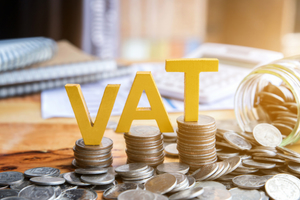CORPORATE
INCOME TAX
SERVICES IN
SAUDI ARABIA
Our Corporate Income Tax (CIT) service in Saudi Arabia is part of our tax consultancy services in Saudi Arabia.
Corporate Income Tax is interchangeably referred to as Corporate Tax across the GCC countries. It is a form of direct tax collected by governments as a source of income; it is levied on the net income or profits of corporations and businesses.
CORPORATE INCOME TAX IN SAUDI ARABIA FAQs
Corporate Income Tax in Saudi Arabia applies to joint ventures based on the nationality of the partners involved. If the joint venture includes non-Saudi investors, their share of the income is subject to CIT, while the portion attributable to Saudi or GCC investors is liable for Zakat. The tax implications can be complex depending on the structure of the joint venture and the nature of its operations. Understanding the nuances of how CIT applies to joint ventures can help ensure compliance and optimize tax outcomes. Our tax experts are ready to assist you in navigating these complexities.
Foreign-owned companies operating in Saudi Arabia are generally subject to Corporate Income Tax on their profits. The tax rate is 20% on the net adjusted profits, but specific rules apply depending on the industry, such as higher rates for companies in the oil and hydrocarbons sectors. Foreign companies must also comply with local tax regulations, including withholding tax on certain types of payments to non-residents. Understanding these obligations is crucial for foreign companies to avoid penalties and ensure smooth operations in Saudi Arabia. Our team can provide the guidance you need to comply with these regulations.
Companies operating in Saudi Arabia are required to file their Corporate Income Tax returns annually, typically within 120 days following the end of their financial year. The tax return must include detailed financial statements, tax calculations, and any relevant supporting documentation. Failure to file on time can result in penalties and interest charges. Accurate and timely filing is essential to avoid complications. Our tax specialists can assist in ensuring your returns are filed correctly and on time.
Dividends distributed by a company in Saudi Arabia to its non-Saudi shareholders are subject to a 5% withholding tax. This tax is deducted at the source before the dividends are paid out. The withholding tax rate can be lower if a double tax treaty is in place between Saudi Arabia and the shareholder’s country of residence. Proper planning and understanding of dividend taxation are crucial for optimizing the returns to shareholders. We can help you navigate these rules and optimize your dividend distribution strategy.
Saudi tax laws allow certain deductions when calculating Corporate Income Tax, including operating expenses, depreciation of assets, and specific allowances. However, some expenses, like fines and penalties, are not deductible. Understanding what qualifies as a deductible expense is crucial for accurate tax planning. Additionally, specific sectors may have unique deductions or incentives. Consult with us to ensure you maximize your deductions and minimize your tax liability.
While VAT and Corporate Income Tax are distinct, they interact in ways that can affect a company’s overall tax strategy. VAT is levied on the sale of goods and services, while CIT is levied on profits. Understanding the interplay between these two taxes, especially regarding deductible expenses and how VAT payments may impact net profits, is essential for comprehensive tax planning. Our team can provide insights on managing both VAT and CIT effectively.
Saudi Arabia’s transfer pricing regulations require that transactions between related entities be conducted at arm’s length, meaning the terms should reflect those of transactions between independent parties. These regulations are crucial to prevent profit shifting and ensure that taxable income is accurately reported in Saudi Arabia. Non-compliance with transfer pricing rules can lead to significant penalties. Our experts can assist you in developing a transfer pricing strategy that complies with Saudi regulations while optimizing your tax position.
E-commerce businesses in Saudi Arabia are subject to the same Corporate Income Tax as traditional businesses, but there are unique considerations regarding VAT, cross-border transactions, and digital services. Revenue generated from online sales to Saudi residents is considered Saudi-sourced income, which makes it subject to CIT. Ensuring compliance in this fast-evolving sector requires a deep understanding of both corporate and VAT laws. Our team can help your e-commerce business stay compliant and optimize its tax strategy.
The oil and gas sector in Saudi Arabia faces higher Corporate Income Tax rates, ranging from 50% to 85%, depending on the level of participation and the type of activity. Companies engaged in this sector must adhere to stringent reporting and compliance requirements, including separate tax bases for different types of activities. Given the complexity and the potential for significant tax liabilities, companies in this sector need specialized tax planning and compliance strategies. Our experts have the industry-specific knowledge to help you navigate these challenges.
Capital allowances in Saudi Arabia allow businesses to deduct the cost of capital assets over time from their taxable profits, thereby reducing their tax liability. These allowances are spread over the useful life of the asset and are subject to specific rates and conditions set by the tax authority. Properly calculating and applying capital allowances can significantly impact a company’s taxable income. Let us help you accurately calculate your capital allowances to ensure compliance and optimize tax savings.
Real estate investments in Saudi Arabia, whether made by residents or non-residents, are subject to Corporate Income Tax if they generate income. This includes rental income, capital gains from property sales, and income from real estate development projects. The tax treatment can vary depending on the structure of the investment and the type of income generated. We can guide you through the tax implications of your real estate investments to ensure compliance and optimize returns.
Saudi tax law allows companies to carry forward losses from previous years to offset future taxable income, thereby reducing future tax liabilities. However, there are limitations on the period for which losses can be carried forward and the amount that can be offset in any given year. Proper management of loss carryforwards is crucial for tax planning, especially for businesses with fluctuating income. Our tax professionals can help you manage your loss carryforwards effectively to minimize your tax burden.
Saudi Arabia has entered into numerous international tax agreements (double tax treaties) that can impact how foreign income is taxed. These agreements often provide relief from double taxation, reduce withholding tax rates, and set out rules for determining tax residency. Understanding how these agreements apply to your business is essential for optimizing your international tax strategy. We can help you navigate the complexities of international tax agreements to ensure your business benefits from available tax reliefs.
The Saudi Tax Authority provides a formal process for resolving disputes related to Corporate Income Tax. This process involves filing an objection with the authority, which will review the case and issue a decision. If the taxpayer disagrees with the decision, they can appeal to the tax appeal committee. Navigating this process requires a thorough understanding of tax law and the ability to present a well-documented case. Our legal and tax experts can support you through every stage of a tax dispute to ensure the best possible outcome.
A permanent establishment in Saudi Arabia, defined as a fixed place of business or a significant presence through which business is conducted, is subject to Corporate Income Tax on the income attributed to that establishment. The definition of a permanent establishment can include branches, offices, factories, and construction sites, among others. Properly identifying and reporting income from permanent establishments is crucial to comply with tax regulations. Let us help you determine whether your business has a permanent establishment in Saudi Arabia and how to manage its tax obligations.
Cross-border transactions, including imports, exports, and services provided to or received from foreign entities, may be subject to Corporate Income Tax in Saudi Arabia, especially if they involve a permanent establishment within the country. Additionally, such transactions might also trigger VAT obligations. Managing cross-border transactions requires careful consideration of transfer pricing, withholding taxes, and international tax treaties to avoid double taxation and ensure compliance. Our team can provide expert advice on managing cross-border transactions efficiently and in compliance with Saudi tax laws.
Companies in Saudi Arabia are required to maintain accurate financial records and may be subject to audits by the tax authority to verify their Corporate Income Tax filings. These audits can include a review of financial statements, supporting documents, and tax calculations. The frequency and scope of audits can vary depending on the size and nature of the business. Being prepared for an audit is essential to avoid penalties and ensure that your tax affairs are in order. We can assist in preparing for audits and ensure that your company’s tax records meet regulatory standards.
For companies with both Saudi/GCC and non-GCC ownership, the Corporate Income Tax rate is applied only to the portion of the income attributable to non-GCC shareholders. The income attributable to Saudi/GCC shareholders is subject to Zakat instead of CIT. This mixed-ownership structure requires careful allocation of income and expenses to ensure that the correct tax is applied to each portion. Our tax professionals can assist you in accurately determining and reporting the correct tax amounts for mixed-ownership companies.
Startups in Saudi Arabia are subject to the same Corporate Income Tax regulations as established companies, which can impact their profitability, especially in the early stages. However, startups may be eligible for specific tax incentives or deductions that can help reduce their tax burden. Proper tax planning from the outset is essential for startups to manage their cash flow and ensure long-term success. Our team specializes in helping startups navigate tax challenges and optimize their tax strategies for growth.
Non-compliance with Saudi Corporate Income Tax laws can result in severe penalties, including fines, interest charges, and legal action. These penalties can arise from late filing, underreporting income, or failing to pay the correct amount of tax. In some cases, non-compliance can also lead to criminal charges, especially if there is evidence of tax evasion. Ensuring compliance with tax laws is essential to avoid these risks and maintain a good standing with the tax authorities. We can help you navigate the complexities of Saudi tax laws and ensure that your company remains compliant.














